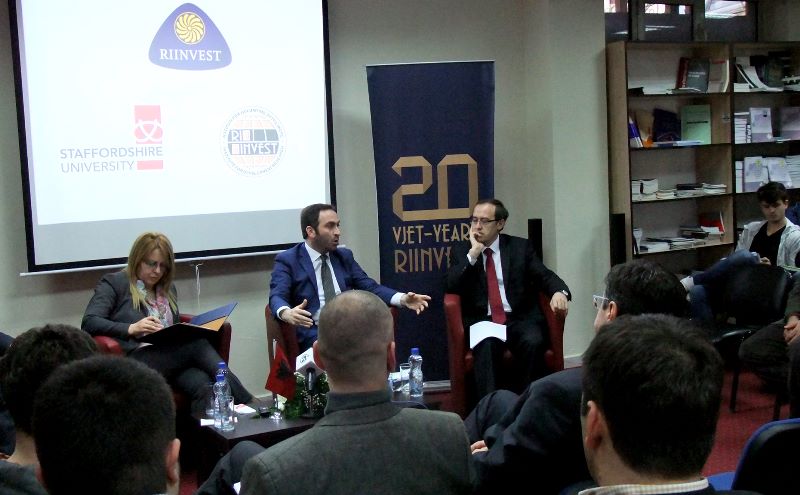Kosovo economy should be based on knowledge
Prishtina, 01.04.2015 – Minister of Economic Development Blerand Stavileci, along with Minister of Trade and Industry Hikmete Bajrami and Minister of Finance Avdullah Hoti, presented to students of Riinvest College, on the 100th day of the new Government, the programmatic orientations of Kosovo Government from the perspective of ministries they head.
Minister Stavileci used the occasion to underline that infrastructure and energy represent two sectors which directly affect the economy of any country, including Kosovo, adding that they comprise prerequisites for economic development, while underscoring the significance of connecting the national economy with the education system.
He said that there is no talk of economic development and interest of foreign investors if the country fails to provide adequate physical infrastructure and sustainable energy supply.
Regarding transport infrastructure, Stavileci said that there an attempt is being made to encompass Southeast Europe in the regional air, road and rail transport networks, with Kosovo benefiting from four projects, two of which already finalized. This group includes the Prishtina – Durrës and Prishtina – Skopje highways, Prishtina Airport concession and railroad connections between Macedonia, Kosovo and Serbia.
According to him, being part of such a network will integrate our country in SEE and wider infrastructural networks, which will directly impact the costs of goods and services.
Speaking of the key sector of energy, the head of MED said that the Government set the development of a 600MW capacity TPP as one of its utmost priorities. Said capacity will supplement the current generation capacities and provide for the electricity demand, as stable electricity supply is one of preconditions for any investors’ interest.
“The development of TPP Kosova e Re has no alternative, but this lignite-based facility will also be complemented by EE and RES measures. We will soon have a fund which be geared towards energy saving measures (at affordable prices), reduction of emissions and stimulating employment,” Stavileci said, adding that to date preliminary authorizations have been granted for some 350MW in RES capacity investments.
The Head of MED further assessed that Information and Communication Technology represents a unique sector, which is directly related to other sectors and impacts economic development. According to him, ICT can serve as a development promoter for all spheres, underscoring how Estonia, with a population of 1.8 million, has had a prompt development in this field.
Another important asset, emphasized Stavileci, are the country’s human resources. He said that our economy should be based on knowledge. “We should know our natural and human resources. We should discontinue the current trend of ‘serial production’ of human resources graduated in fields which are not in demand in the labor market. We should identify sectors that are able to generate economic development and human resources should be oriented in such fields, so as to ensure their integration in the labor market as soon as possible,” he said.
In his concluding remarks, the Head of MED also spoke on Government’s enticement instruments for certain spheres. He said that a number of creative sectors will be favored under the employment and development fund, the main criteria for the utilization of which will be the component of contemporary education, in line with market needs, and supporting businesses which fulfill employment and innovation prerequisites.
For her part, Minister of Trade and Industry Hikmete Bajrami said that the Government is focused on restoring the trust of investors and has taken a number of steps in this direction, including the removal of barriers and facilitation of procedures, aware of the fact that bureaucracy represents one of the key obstacles to economic development.
On the other hand, Minister of Finance Avdullah Hoti said that the inherited economic situation is not favorable, therefore the government has focused on fiscal reforms which directly affect lives of citizens, such as introduction of a gradual VAT, etc.

